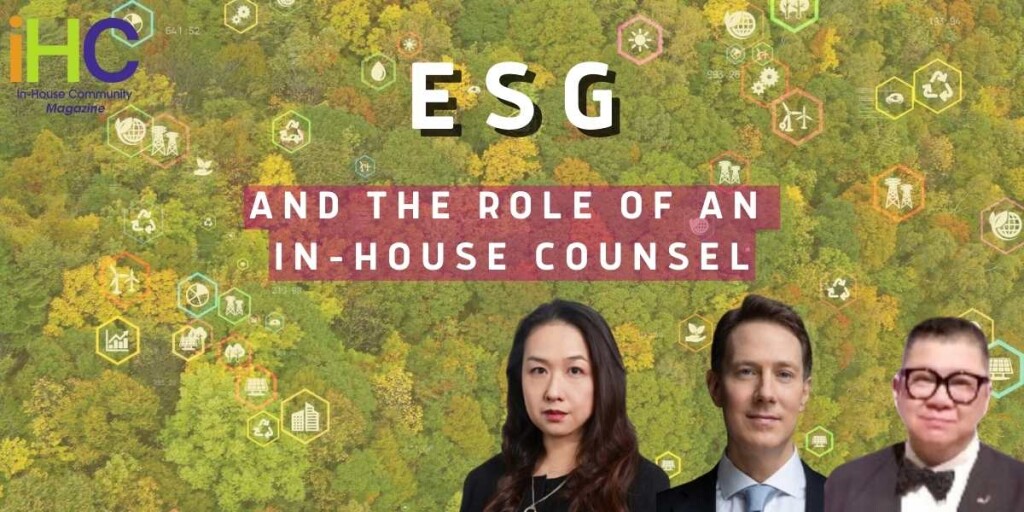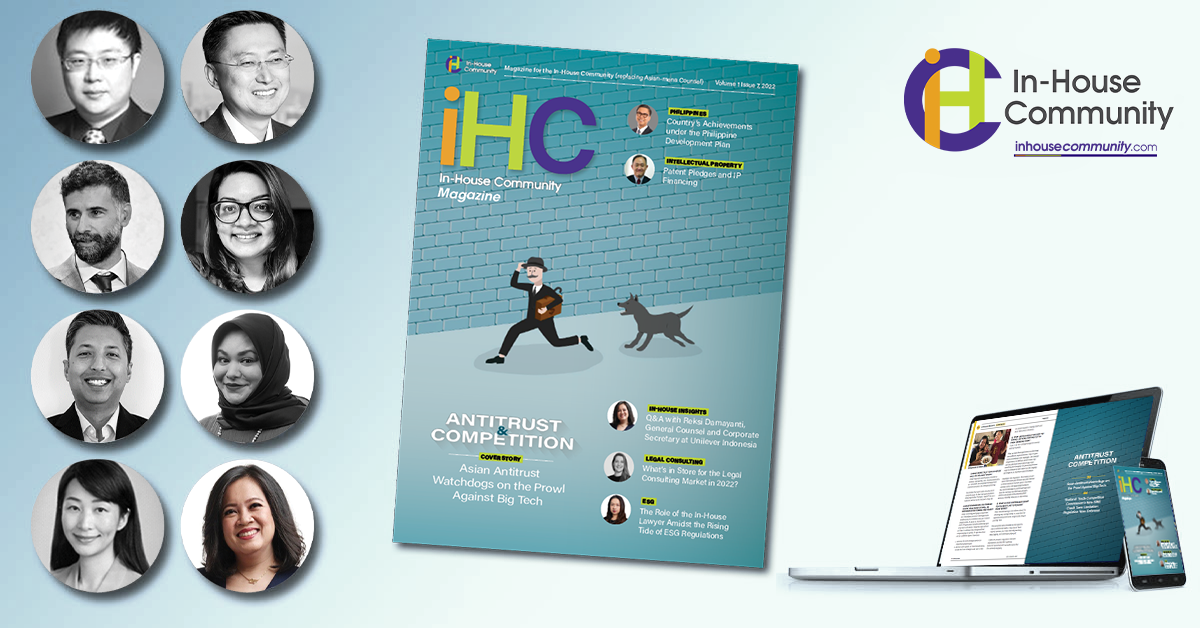
Environmental, social, and governance (ESG) factors are fast making their way into mainstream business and investment consciousness. Far from being the cherry-on-top of an otherwise good company, these criteria are increasingly becoming part and parcel of business practice. Pressure to adopt ESG standards has come from consumers and a growing responsible investment community, as well as the expansion of governmental and regulatory requirements.
These standards create the framework for all stakeholders, including lawyers, to assess the sustainability and ethical practices of a company when reporting on such company or in making investment decisions.
Indicative of this trend toward increased ESG focus, in late November 2021, the Hang Seng Indexes Company launched a new index in which socially responsible considerations sit up front and center – the HSI ESG Screened Index (HSI ESG). This index applies ESG principles to the standard Hang Seng Index (HSI), with constituents screened for compliance against the United Nations Global Compact (UNGC) Principles as well as for involvement in controversial product.
Focus on ESG criteria has thus come a long way from being about feel-good investment choices; these factors are now regulated and widely tracked. More than this, however, focus on companies adhering to ESG principles may well make financial sense. In comparing the performance of the HSI ESG to the HSI from the base date of the former, 7 December 2018, to present we see that the HSI ESG actually outperforms the market standard – and by a relatively long way.
As Mark D. Schroeder, Strategic Advisor to the Governance Solutions Group , put it, ESG frameworks help us assess the impact of a company to create value over time, in other words it’s about “doing well by doing good”.
So, what does this mean for the in-house legal community? To best understand the characters in this production and the role of the lawyer, one needs to get acquainted with the backstory that has gotten us to where we are and the scene that it sets.
Drivers Of Change
Vivien Teu, partner and head of ESG at Dentons in Hong Kong, highlighted as catalysts for this ESG movement, the growing public consensus on the trend amidst increasing expectations and requirements of institutional investors, governments, regulators, and consumers.
Schroeder indicated that in China pressure has come primarily from regulators, such as the China Securities Regulatory Commission. In Hong Kong, the financial regulators – the Hong Kong Monetary Authority and the Securities & Futures Commission – have led the way, while the Hong Kong Stock Exchange (HKEx) listing rules have clout over listed companies. Outside of these primary influencers, he said, we can look to the institutional investment community, such as Black Rock, Fidelity, and BNP Paribas, as drivers of change. Corporate reporting standards, in turn, are the consolidated effort of the Sustainability and Accounting Standards Board (SASB), the Global Reporting Initiative (GRI), the Task Force on Climate-Related Financial Disclosures (TCFD), and the International Financial Reporting Standards Foundation (IFRS); and for the investment community, the United Nations Principles for Responsible Investment (UNPRI).
Of course, not all sustainability issues can be blanketed into one framework and many are dealt with individually.
“On climate and environment, especially, laws and regulations have been introduced in recent years with mandatory requirements, and with more to come as many countries commit to climate goals aligned with the Paris Agreement. Under the Strategic Framework for Green Finance, announced in December 2020 by the Hong Kong Green and Sustainable Finance Cross-Agency Steering Group and co-chaired by the Hong Kong Monetary Authority and Securities & Futures Commission, climate-related disclosures aligned with the recommendations of the TCFD will be mandatory across relevant sectors no later than 2025,” Teu said.
Teu further cautioned that with global financial markets and cross-border investment, as well as global supply chains, foreign or international laws and regulations – such as the EU Corporate Sustainability Reporting Directive and the EU Sustainable Finance Regulation – might mandate additional disclosures or due diligence regarding ESG issues such as labor practices, modern slavery, bribery or corruption, human rights abuses in supply chains, and climate and environmental matters.
ESG And The In-house Lawyer
Given the above, there seems to be something of a minefield of new and existing regulations and best practice, both at the local level as well as international.
In order to navigate this sea of change, Chee Hoong Pang, Regional General Counsel for Agis, advised that in-house counsel are required to take on a wider role, becoming part of the “think tank” responsible for establishing the company’s ESG strategy and guiding its business conduct, procedures, and processes to abide with developing ESG laws and regulations.
It falls on in-house counsel, specifically those with dual legal and compliance responsibilities, to keep abreast of ESG developments.
In-house counsel, Pang recommended, “should embark on upskilling themselves on ESG issues such as (i) green finance, (ii) supply chain integrity, (iii) business human rights protection, (iv) their industry specific standards for business conventionalities, (v) COP26, and (vi) local government regulations, standards and code of practice and consequences of their breaches (e.g., fines, prosecution, reputational loss, commercial loss, termination of contracts, etc.)”
On a practical level, Teu outlined some of the ESG related requirements for both listed and non-listed companies in Hong Kong.
“The Hong Kong Companies Ordinance requires companies to include, in the business review section of the annual directors’ report, a discussion on the environmental policies and performance; an account of the company’s key relationships with its employees, suppliers and others that have a significant impact on the company; and a statement on compliance with relevant laws and regulations with significant impact on the company. This applies to all Hong Kong companies, unless exempted (such as for private companies below certain thresholds or size), whereas public companies are generally subject to the requirement.”
“The HKEx is one of the earliest stock exchanges to require listed companies to issue an ESG report (since 2013). Therefore, companies listed on the HKEx are also subject to ESG reporting requirements, which have now been enhanced to being mandatory to report on board engagement and oversight on ESG matters and with ‘comply or explain’ disclosure obligations in relation to four environmental aspects and eight social aspects,” Teu said.
Thus, in-house counsel, Teu explained, “has or can play a key role in supporting the board of directors and senior management of the company or corporate group to put in place relevant internal structures, policies, systems and processes for board and management oversight and management of ESG issues in its business lines and operations. They can also play a part in advising internal stakeholders on relevant laws and regulations relating to the ESG issues that have an impact in the business operations of the company or corporate group.”
Teu emphasized the need to consider not only ESG issues that have (financial) impact on the company or corporate group, but also ESG issues that may impact stakeholders or the community from the conduct of business activities and operations – the concept of “double materiality” that is gaining awareness.
In sharing his own experience as an in-house counsel, having taken on the additional roles of Ethics and Risks correspondent, Pang illustrated what an in-house counsel may expect from the coming years in the ESG arena and how to best be prepared.
“I anticipate a trajectory increase in my involvement at both regional and Group levels on ESG issues and their risks management, including their identification, assessment, prioritization, mitigation, closure and monitoring. Given the fast output in laws, regulations, industry standards, public expectations, and the legal accountability of both governments and corporations in relation to climate change and human rights concerns, there is always room for improvement as we navigate our way to align with the strategic priorities, objectives, and planning of the company.
“However, we need to be future-proof and not just meet current requirements, and it will be helpful to partake of industry bodies and government/regulatory consultations with emphasis on ESG compliance, opportunities, and challenges specific to their sector (e.g., to share best practice and create common standards and taxonomies),” Pang explained.
“Greenwashing” And Ticking Boxes
There exists a concern, however, that some companies have merely tried to “greenwash” their processes and ask their in-house lawyers, in this instance, to perform something of a “tick-box” exercise when it comes to following ESG protocols.
In advising against such practices, Dentons’ Teu referred to the enhanced ESG reporting requirements of the HKEx for listed companies, introduced in December 2019, which apply to financial reporting periods after July 2020. These, she said, were introduced as previous generic disclosures of listed companies’ ESG reports were considered highly inadequate.
“Institutional investors, as well as regulators, are increasingly expecting more transparency and reporting on ESG information, data and metrics. Companies that engage in greenwashing will not eventually be able to stand up to increasing scrutiny, which will place the company under reputational risk if claims of positive E, S or G performance turn out to be false,” Teu cautioned.
Schroeder added that there is real value in a robust disclosure of all ESG risks and opportunities, regardless of the direction in which they’re moving. More disclosure, he said, will prevent accusations of greenwashing and can provide an opportunity for a company to admit to issues and show what they are doing to actively deal with them.
Teu further warned that there are business concerns beyond those reputational in nature.
A company that engages in greenwashing instead of having appropriate processes on ESG will likely have ESG risk issues
“A company that engages in greenwashing instead of having appropriate processes on ESG will likely have ESG risk issues that are not properly managed as they should be, and which can turn into significant business risks or financial risks for the company, or such company may find itself in breach of applicable ESG-related law or regulations. For such companies, its directors and management may be falling short of the expected legal or statutory duty of care. That exposes the companies as well as the individuals to legal or regulatory risks. In-house counsel should remind boards of directors and management of such risks and strongly urge that ESG issues should be taken seriously,” she said.
Schroeder further emphasized that to achieve accuracy and efficacy in disclosures, legal and business should not be operating in isolation of each other. He stated that the role of the Chief Sustainability Officer (CSO) is no longer a sidelined one but rather a core function involved in the profit and loss of a company and one that, in his opinion, belongs in the legal function.
In echoing these sentiments, Pang said that management of ESG standards should be jointly driven by business and all support functions, including legal. He views his role as an in-house counsel on these matters to be a collaborative one in nature, where he finds himself working alongside teams at multiple levels (both group and regional) and from multiple backgrounds, including business, science, environmental studies, engineering, and communications.
This approach, in which duties and responsibilities are shared by multiple functions, creates an environment of checks and balances which may limit undue pressure from any one business unit to skirt ESG protocol.
Teu also suggested that companies need to move beyond a compliance mindset, which tends to be reactive instead of proactive, especially with fast evolving ESG standards and requirements. In this, companies should conduct a deep review with key internal and external stakeholders to identify core corporate purpose and values, and assess material ESG issues in its business and operations. “This process will enable companies to be prepared and build resilience, establishing internal and external communication channels for meeting new ESG disclosure or reporting requirements,” Teu said.
Harmonization And Alignment
Complying with all relevant laws and regulations seems a tall ask, especially for companies operating internationally. However, there may be hope that the role of the in-house lawyer and the requirements placed on a given company will become more streamlined with time. In this, Schroeder emphasized the importance of the standardization of requirements and that such may be within sight.
“Without standardization, ESG disclosure is a PR exercise and is essentially meaningless. The value of rigorous adherence to standards is the credibility that comes with it. Once the IFRS has gained more momentum in its ESG standardization project, issuers that have not already begun to fully disclose across all parameters will find themselves scrambling.
“Due to the efforts in Europe with the EU Taxonomy, similar efforts have followed such as those of the Monetary Authority of Singapore (MAS), publishing ESG standards to influence the ASEAN region, as well as the IFRS, with their recently launched International Sustainability Standards Board (ISSB). Indeed, substantive momentum towards global standardization is happening. This said, the likely future is that each relevant regulator within each jurisdiction will ultimately establish their own taxonomy (for example, we are likely to see ‘ESG with Chinese Characteristics’),” Schroeder said.
While standardization may seem like the golden ticket, Schroeder said that specification by industry is key as there are many differences between each industry and each market. While a single blue print might seem enticing as it can ease some burden on management, should such become regulation it could be an issue.
For now then, it remains up to the in-house lawyer to provide guidance on navigating the web of interrelated ESG laws and regulations that, to some extent, seem likely to remain complex.
In providing some concluding remarks, Schroeder declared that shareholder centrism has ended. It’s now about all stakeholders, being employees, clients, suppliers and society as a whole. Stakeholder Capitalism, as he calls it, is here to stay. The private sector, rather than government, is being called on now, more than ever, to solve the big challenges our societies face. To this end, being well versed in the roles we can play in both business and legal functions can have far-reaching impacts.
Disclaimer: The views and opinions expressed in this article are those of the author. This article is for general information and educational purposes, and is not offered as, nor does it constitute, legal advice or legal opinion.
By Vivien Teu, Mark D. Schroeder, Chee Hoong Pang

Vivien Teu Vivien is a partner and head of Asset Management & ESG at Dentons Hong Kong. She has more than 20 years’ experience as a corporate lawyer, specializing in the investment management and financial services industry, and has developed a unique focus around environmental, social and governance issues. |

Mark D. Schroeder Mark D. Schroeder has been providing legal and regulatory advisory in China and Asia for more than 20 years. His practice includes corporate governance, with a focus on ESG integration and ethics consulting often involving compliance investigations as well as data privacy, data protection, cyber-security and disclosure structure / mechanisms. Based in Hong Kong and responsible for North Asia at EPIQ, Schroeder also serves as an external advisor to GSG (Governance Solution Group) on corporate governance and ESG best practices, frequently including integrity issues and disclosure advisory. |
 Chee Hoong Pang Chee Hoong Pang
C H Pang is a construction and engineering, and commercial/corporate lawyer, a Certified Fraud Examiner, a certified Enterprise Risk Advisor, Business Continuity Manager and ISO37001 Anti-bribery Lead Implementer. His most recent regional position focuses on contracts, mergers & acquisitions, ethics and compliance, risk management strategy, and corporate/ secretarial matters. |
* This article was first published in the Feb 2022 issue of the IHC Magazine. You can read/download the magazine here.












